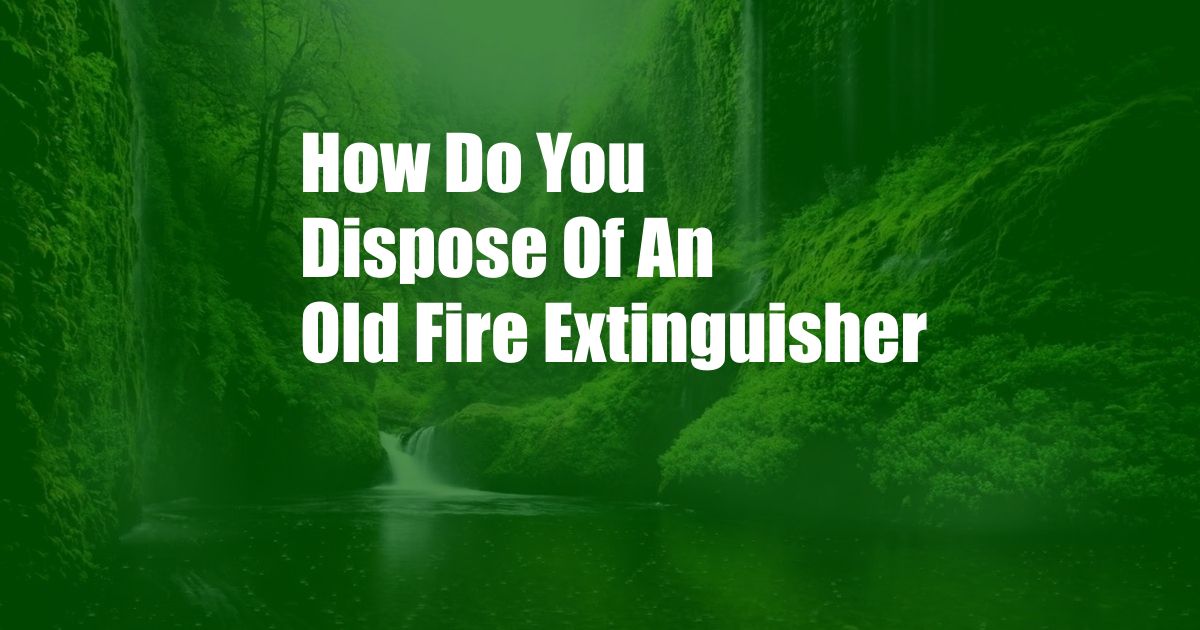
**How to Dispose of an Old Fire Extinguisher**
Stumbling upon an aging fire extinguisher in your home or workplace might raise questions about its disposal. Fire extinguishers, especially those containing hazardous materials, require proper disposal methods to prevent environmental hazards and ensure public safety. In this comprehensive guide, we’ll delve into the intricacies of disposing of an old fire extinguisher, exploring the nuances, regulations, and expert recommendations.
Fire extinguishers serve as guardians of safety, standing ready to quell unforeseen blazes. However, as time takes its toll, these protectors may reach the end of their serviceable life. Recognizing the need for responsible disposal, this article aims to empower you with the knowledge and guidance necessary to bid farewell to your old fire extinguisher in an environmentally conscious and compliant manner.
**Understanding Fire Extinguishers and Their Components**
To embark on this disposal journey, it’s imperative to understand the anatomy of a fire extinguisher. These devices employ various extinguishing agents, each tailored to combat specific fire types. Common extinguishing agents include water, dry chemical, carbon dioxide, and clean agents. Additionally, older models may contain hazardous substances such as halon or chlorofluorocarbons (CFCs), which necessitate specialized disposal procedures.
The extinguishing agent is housed within a pressurized cylinder, typically constructed from steel or aluminum. This cylinder is equipped with a discharge mechanism, enabling the controlled release of the extinguishing agent. Proper disposal involves addressing both the extinguishing agent and the cylinder, ensuring responsible management of these components.
**Navigating Disposal Options for Different Extinguisher Types**
Fire extinguishers are categorized into different types based on their extinguishing agents. Each type carries its own disposal requirements, dictated by the potential hazards associated with the extinguishing agent.
- Water Extinguishers: Extinguishers charged with water pose minimal environmental risks and can often be disposed of as regular waste. However, ensure the cylinder is empty and the discharge mechanism is disabled.
- Dry Chemical Extinguishers: These extinguishers utilize a powdered chemical to smother flames. Dispose of dry chemical extinguishers at hazardous waste facilities, as the chemical residue can be harmful to the environment.
- Carbon Dioxide Extinguishers: Carbon dioxide extinguishers release a non-flammable gas to extinguish fires. They can be disposed of as regular waste once the cylinder is empty and the discharge mechanism is disabled.
- Clean Agent Extinguishers: Clean agent extinguishers employ environmentally friendly gases to extinguish fires. Check with local regulations for specific disposal guidelines, as disposal methods may vary depending on the specific clean agent used.
- Halon and CFC Extinguishers: These extinguishers contain ozone-depleting substances and require specialized disposal at designated hazardous waste facilities. Never attempt to dispose of these extinguishers as regular waste.
**Expert Tips and Advice for Safe Disposal**
To ensure the safe and proper disposal of an old fire extinguisher, heed these expert tips:
- Identify the Extinguisher Type: Determine the type of fire extinguisher you have, as this will influence the disposal method.
- Empty the Extinguisher: Discharge the remaining extinguishing agent before disposal. For water extinguishers, simply discharge the water. For other types, consult the manufacturer’s instructions.
- Disable the Discharge Mechanism: To prevent accidental discharge, remove the discharge mechanism or pin from the extinguisher.
- Contact Waste Management Services: Reach out to your local waste management company or hazardous waste disposal facility to inquire about proper disposal options.
- Follow Local Regulations: Adhere to local regulations and ordinances governing the disposal of fire extinguishers.
By following these expert recommendations, you can ensure the responsible disposal of your old fire extinguisher, protecting the environment and upholding public safety.
**Frequently Asked Questions on Fire Extinguisher Disposal**
Q: Can I dispose of fire extinguishers in my regular trash?
A: No, most fire extinguishers cannot be disposed of as regular waste. The extinguishing agents and pressurized cylinders require specialized disposal methods to prevent environmental and safety hazards.
Q: Where can I find a hazardous waste disposal facility?
A: Contact your local waste management company or search online for hazardous waste disposal facilities in your area. They will provide guidance on the disposal process and any applicable fees.
Q: What should I do if I have a fire extinguisher containing halon or CFCs?
A: Halon and CFC extinguishers must be disposed of at specialized hazardous waste facilities. Never attempt to dispose of these extinguishers as regular waste, as they contain ozone-depleting substances.
Q: Can I dismantle a fire extinguisher before disposal?
A: Do not dismantle a fire extinguisher unless you have the proper training and equipment. Dismantling can release hazardous substances or cause the extinguisher to discharge unexpectedly.
Q: Is it necessary to dispose of empty fire extinguishers?
A: Yes, even empty fire extinguishers require proper disposal. The pressurized cylinder can still pose a safety hazard if not disposed of correctly.
**Conclusion**
Disposing of an old fire extinguisher involves a thoughtful approach that considers the type of extinguishing agent, local regulations, and safe disposal practices. Understanding the nuances of fire extinguisher disposal empowers you to contribute to environmental protection and ensure the safety of your community. By adhering to the guidelines outlined in this article, you can confidently navigate the disposal process and bid farewell to your old fire extinguisher responsibly.
Are you curious about the latest advancements in fire extinguisher technology? Would you like to learn more about the history of fire extinguishers? Share your thoughts and engage with us in the comments section below.